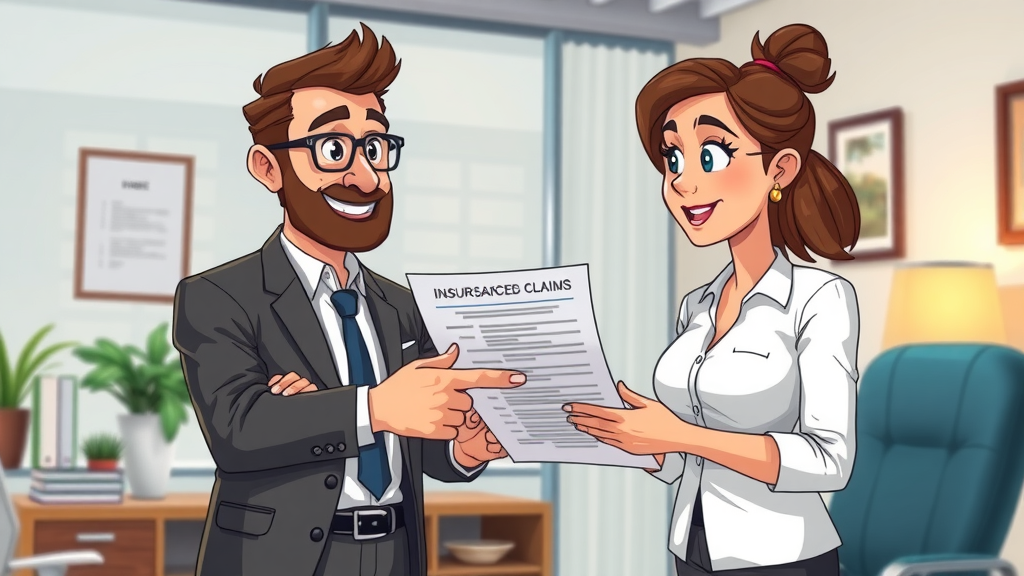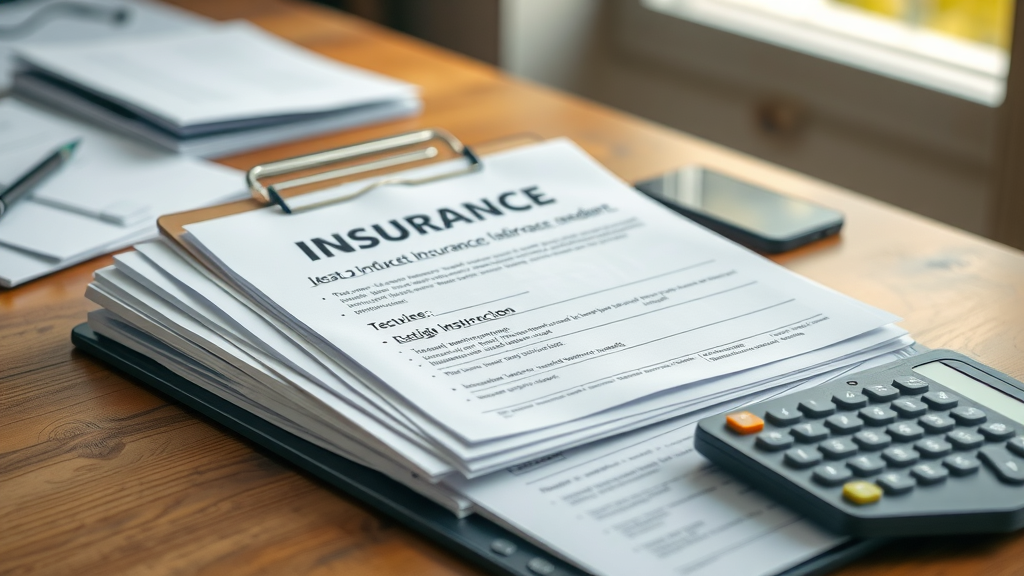Startling Fact: Studies show nearly 70% of policyholders who negotiate their insurance settlement receive higher payouts than those who accept the first offer. Yet, most still leave money on the table. If you want to learn how to negotiate insurance claims and maximize your settlement, this comprehensive guide will arm you with insider tactics, common pitfalls, and actionable strategies to negotiate like a pro—no matter the complexity of your claim. If you’ve felt overwhelmed dealing with insurance companies, you’re not alone, and the tools for success are within your grasp.
Unveiling the Truth About How to Negotiate Insurance Claims: Why Most People Settle for Less
Understanding how to negotiate insurance claims can be game-changing for your financial well-being. Many policyholders unwittingly accept initial offers from insurance companies, thinking it's the best they’ll get. However, adjusters are trained to minimize payouts to protect their employer’s bottom line. Too often, claimants who aren’t prepared, or who don’t understand the complexity of settlement negotiation, walk away with far less than they deserve.
Insurance companies know that most people are unfamiliar with the claim process, and they use this knowledge to their advantage. When dealing with property damage or a personal injury claim, you might receive a lowball offer. Realizing that negotiations matter is the first step—armed with documentation and a willingness to advocate for yourself, you can transform an initial offer into a fair settlement .
From organizing your damage claims to tracking conversations with your claims adjuster , being methodical is key. Insurance settlement negotiation isn’t just about persistence; it’s a skill—one this article will help you master. By understanding why most accept less and how to avoid these traps, you’ll be positioned to secure the best possible settlement amount for your claim.

Eye-Opening Statistics on Insurance Settlement Negotiation and Claims Success
Recent industry statistics reveal that those who attempt to negotiate settlement offers from insurance companies are likely to receive up to 40% more compensation on average compared to those who accept the first offer. Only about 30% of claimants challenge the initial proposal, often unaware that insurance companies expect negotiations as a standard part of their process.
Additionally, the National Association of Insurance Commissioners reports that damage claim denials and reductions have surged by 15% over the past decade, a trend linked to increased claims and stricter insurance adjuster scrutiny. Despite these challenges, claimants who organized thorough documentation and communicated effectively with claims adjusters reported an 80% higher likelihood of a positive outcome. These eye-opening numbers underscore the necessity of learning the negotiation process and actively working toward a fair settlement .
With most settlements never exceeding the initial offer without pushback, there’s tremendous opportunity for those willing to invest time in researching and asserting their rights. If you’re committed to avoiding a lowball offer and maximizing your compensation, understanding these statistics gives you a strategic advantage when tackling your next insurance settlement negotiation.
How to Negotiate Insurance Claims: Essential Steps for Effective Settlement Negotiation
The most effective way to approach how to negotiate insurance claims is to treat the process as a structured project—complete with preparation, documentation, strategy, and communication. You must start by understanding your insurance policy, what’s covered, and the specific requirements for your damage claims . This clarity helps you firmly establish the scope of your loss and the basis for your compensation request.
Begin by gathering detailed evidence—photos, receipts, witness statements, repair estimates, and any relevant correspondence. Next, draft a detailed demand letter that outlines all your losses, substantiates your claim with documentation, and specifies a fair settlement amount that reflects your true damages. The demand letter becomes your formal statement to the insurance company, serving as the foundation for all further discussions.
Throughout this process, maintain a record of all communications with your claims adjuster or insurance company . Respond promptly and with professionalism, showing that you’re informed and prepared to negotiate. Being proactive and organized sends a clear signal that you expect a fair settlement, and it helps build your leverage during each stage of settlement negotiation .
Understanding the Insurance Claim Process with Insurance Companies
Initiating an insurance claim sets off a well-defined sequence of events orchestrated by insurance companies . First, the insurer assigns a claims adjuster who reviews your documentation, visits the scene of property damage if applicable, and assesses the extent of your loss. The adjuster is tasked with balancing your needs with the company’s bottom line, often employing standardized methods to project a settlement amount.
Your role is to supply accurate, timely, and complete information at each stage. From initial notice to final negotiation, communicating transparently with your insurance adjuster builds trust while protecting your interests. Always request updates, clarify timelines, and document every touchpoint. This not only keeps your claim moving forward but also serves as evidence if settlement negotiations become adversarial.
By appreciating the pressures and interests driving the claims process, you can anticipate common tactics—such as quick but insufficient first offers or requests for excessive documentation. Recognize that insurance companies often hope claimants will accept a low offer to close the file quickly, so being persistent and detail-oriented is your best defense.

Why Preparation Is Key: Organizing Your Property Damage and Damage Claims
Thorough preparation is essential when learning how to negotiate insurance claims . Organizing your documentation—such as repair invoices, damage photos, correspondence, and witness statements—creates a compelling case for a higher settlement amount . Insurers are more likely to offer fair compensation when faced with undeniable evidence, as documentation leaves little room for disputes.
Take a methodical approach: start a claim-specific folder and save all related materials, from emails with the insurance company to your detailed inventory of property damage. Record the condition of your belongings, any out-of-pocket expenses, and ongoing costs resulting from the claim event. Timely, organized information not only expedites the process but also empowers you to push back against a lowball offer with confidence and authority.
Remember, every detail can be crucial in complicated damage claims or larger property damage scenarios. If you're facing unique challenges—such as ambiguous policy language or substantial losses—enlist the help of a public adjuster early in the process. Their expertise can mean the difference between a frustrating experience and a fair, timely settlement negotiation outcome.
Proven Tips for Communicating with Insurance Adjusters and Claims Adjusters
Effective, respectful communication is vital when dealing with insurance adjusters or claims adjusters . Always be factual, keeping emotion out of discussions while being clear about the damages and your request for compensation. Ask precise questions about your policy coverage, assessment methods, and settlement calculation to ensure you and the adjuster are working from the same facts.
Document all conversations. Each phone call or email with your claims adjuster can shape the path of your settlement negotiation . Written records help clarify misunderstandings and provide a paper trail should disputes arise. Avoid accepting verbal offers or demands—always request written confirmation to protect your interests.
If you ever feel pressured to quickly accept a settlement offer , politely state that you’ll review all details and consult pertinent documentation before making any decision. Setting boundaries in your communication indicates that you’re informed, patient, and serious about reaching a fair settlement amount.
Essential Documents Needed for Insurance Settlement Negotiation
Successful insurance settlement negotiation requires a suite of essential documents. The most critical include a copy of your insurance policy, detailed photos of property damage, repair estimates, receipts, medical records (for personal injury), and correspondence logs with the insurance company and claims adjuster . Each document strengthens your negotiation position and ensures you’re seeking recovery for every eligible loss.
Don’t forget to gather third-party reports, police reports (for car accidents), and expert opinions when warranted—especially in complex or high-value claims. Thorough documentation helps validate your demand letter and boosts your credibility during settlement negotiation . The more evidence you have on file, the more difficult it is for insurers to offer less than what’s fair.
Keep everything organized in both digital and physical formats. Digital files (PDFs, scanned images) are easy to submit and retrieve when requested by your insurance company , while hard copies serve as backup. Meticulous records show adjusters you are well-informed and persistent—a combination that leads to stronger, more equitable settlements.

How Insurance Companies Evaluate Your Insurance Settlement and Offer
Insurance companies have a detailed methodology to assess your claim and determine a settlement offer . Their primary goal is to calculate the lowest payout that satisfies policy obligations while protecting their company’s bottom line. To evaluate your insurance settlement , they analyze the documentation, cross-reference policy coverage limits, and perform on-site inspections if necessary.
They may use proprietary software to estimate repair costs for property damage, compare industry rates for medical expenses in a personal injury context, and weigh any mitigating factors—such as pre-existing conditions or depreciation. Knowing this internal assessment process provides insight into how to present your evidence for maximum impact and avoid undervaluation of your damage claim.
Understanding how your claim is evaluated helps you spot and challenge any inconsistencies or inaccurate estimates. It also prepares you to identify when a lowball offer is made, giving you the tools to address it with hard evidence and counter-proposals for fair compensation.
The Role of the Insurance Adjuster and Public Adjuster in Settlement Negotiations
Your main point of contact will usually be the insurance adjuster —an employee whose duty is to investigate, assess, and recommend a settlement amount based on the insurance company’s guidelines. The adjuster’s focus is often to minimize payouts, so being strategic and factual when working with them improves your odds of success. Be aware: insurance adjusters may downplay the extent of damage claims or cite policy ambiguities to justify lower offers.
A public adjuster operates differently. As an independent advocate hired by you, the policyholder, their sole purpose is to maximize your claim’s value and secure a fair insurance settlement. Public adjusters handle communications, evaluate documentation, and present an aggressive case on your behalf. Their expertise can help level the playing field, particularly in complex property damage claims or situations involving large sums of money.
Both adjusters are pivotal to the negotiation process . While the insurance adjuster represents the company, a public adjuster’s loyalty is to you. In high-stakes or confusing cases, involving a public adjuster or even legal counsel is often a smart move when aiming for the highest possible settlement payout.

Insurance Settlement Amount Calculation: Damage Claims and Fair Compensation
Calculating a fair insurance settlement depends on accurate assessment and thorough documentation of your damages. Insurance companies begin with the actual cost to repair or replace damaged property and verify these amounts against your policy exposure. For physical or property damage, this means itemized repair estimates, photos, and receipts are critical. In personal injury cases, it includes medical records, treatment plans, and wage-loss documentation.
Many claimants underestimate the value of intangible losses. If your claim includes pain and suffering or loss of use (as in a major car accident), be sure to provide context—doctor’s notes, witness statements, and daily logs—demonstrating how your life, work, or health has been impacted. Presenting a holistic picture enables a stronger argument for fair compensation .
If you believe the insurance company’s estimate is deficient, don’t hesitate to present your own calculations, third-party assessments, or even an appraisal from a public adjuster as part of your counteroffer. Detailed evidence nearly always leads to increased settlement amounts and more equitable claim resolutions.
Mastering the Negotiation Process: How to Negotiate Settlement Offers with Insurance Companies
The key to mastering how to negotiate insurance claims is approaching each settlement offer strategically. Begin by reviewing the first offer in detail—never accept it on the spot. Insurance companies often propose a lower amount initially, anticipating that some claimants will settle immediately. Instead, ask for the justification behind the offer and request that all calculations be laid out in writing.
Your response should be polite but firm, referring back to the documented evidence submitted and highlighting areas where the settlement amount falls short. Clearly articulate how your losses exceed the current offer, and specify an alternative figure grounded in receipts, invoices, and expert opinions. This keeps negotiations focused on facts—not emotions—and shows that you’re not afraid to challenge lowball offers.
During the negotiation process , track all new information received from the insurance company , and be ready to counter each justification with documented evidence. If negotiations stall, reiterate your willingness to discuss the numbers but express that you won’t accept less than what your documentation supports. Always maintain professionalism, as this strengthens your position and increases your chance of achieving a fair settlement.
Responding to the First Settlement Offer: Tactics and Strategies
Initial offers from insurers are rarely the company’s bottom line . Your best tactic is to thank the adjuster for their assessment and then ask for a detailed, itemized explanation behind their figure. Examine each section for discrepancies: Are repair costs undervalued? Have certain losses been ignored or depreciated unnecessarily?
If the offer is insufficient, respond with a counter-offer using a written letter. List all areas of disagreement, provide supplementary documentation (like third-party repair estimates), and explain why your requested amount is justified. Don’t use emotional arguments—stick to the evidence, as it’s the primary lever in claim negotiation.
Above all, never agree to a settlement out of urgency. Taking your time to review every detail not only signals seriousness but often prompts a more cooperative stance from the insurer. Preparation and patience pay dividends in achieving a fair settlement outcome.
How to Counter Lowball Offers and Negotiate for Fair Settlement Amounts
Receiving a lowball offer is a common experience during insurance claim negotiations, but there are ways to counter this and secure a more equitable outcome. The first step is to analyze where the offer falls short: Is the insurer underestimating repair costs, reducing coverage for certain items, or omitting categories of loss altogether?
Counter with a well-reasoned, evidence-based response. Attach additional documentation (receipts, repair invoices, third-party appraisals) that justify a higher amount. Reference your insurance policy’s coverage and specifically cite sections that obligate the insurance company to cover these losses. A strong, professional tone and a detailed counter-offer often compel the insurance adjuster to elevate their proposal or at least explain their rationale.
Persistence is your ally. If negotiations stall, reiterate the completeness of your claim and your willingness to continue discussions or escalate to a supervisor. If you still encounter resistance, consider bringing in a public adjuster or legal counsel—especially in higher value or complex cases. Remember, the negotiation doesn’t end until you receive a settlement that fully and fairly compensates you for your losses.

Using Evidence to Support Your Insurance Claims and Increase Your Settlement
Evidence fuels your negotiation leverage. Meticulously gathered documentation—such as time-stamped photos, professional repair quotes, medical records, and a detailed incident log—strengthens your demand for fair compensation. Insurers are much more likely to approve a higher settlement amount when faced with irrefutable proof of costs and damages.
Don’t shy away from supplementing your file with witness statements, expert opinions (especially in technical damage claims), and independent appraisals. In the case of contentious property damage, an expert evaluation can highlight issues the insurer’s inspector may have missed, justifying a larger payout.
Present your evidence in a clear, organized manner. Group like-items (repairs, replacements, medical expenses) and highlight how the totals correspond to policy provisions. The more professional and unassailable your materials, the more likely the insurance company is to offer a settlement that meets or even exceeds your expectations.
Leveraging a Public Adjuster or Attorney in Settlement Negotiations
Sometimes, especially in complex or significant cases, hiring a public adjuster or attorney is the best way to tip the scales in your favor. Public adjusters are experts in policy language and claim valuation, working exclusively for you to maximize your payout and streamline cumbersome bureaucracy.
If you’re negotiating a high-value settlement or your claim involves ambiguous coverage areas, a public adjuster can be instrumental in quantifying losses and negotiating directly with the insurer. Their advocacy ensures every legitimate aspect of your insurance claim is considered and compensated fairly.
Legal counsel may become necessary if you face continued disputes or believe your insurer is acting in bad faith. An attorney who specializes in insurance claims can provide robust representation, handle complex negotiations, and, if needed, pursue litigation to secure a just outcome. These professionals are essential partners for claimants serious about achieving the best possible settlement results.
"Insurance companies are incentivized to pay as little as possible — your advocacy can tip the scales in your favor."
Special Considerations: Personal Injury and Car Accident Settlement Negotiations
Not all insurance claims are the same. For personal injury and car accident claims, negotiations tend to be more complex, as these cases often involve multiple parties, varying levels of liability, and higher stakes. Medical expenses, long-term disability, and pain and suffering all play a role in determining a fair settlement amount.
A critical consideration is fully documenting your injuries—medical bills, treatment plans, diagnosis reports, and ongoing therapy notes must all be included. Insurers closely scrutinize these cases, and adjusters are likely to question treatments or request additional proof. Persistence and detailed records are essential for a fair outcome in personal injury and car accident settlement negotiation.
Securing legal or expert representation can also be more important in these scenarios to ensure every aspect of your damages—from out-of-pocket expenses to lost future earnings—is included in your final settlement offer. Be prepared to negotiate firmly and use the evidence at your disposal to advocate for fair compensation.
Negotiating Insurance Claims for Personal Injury: What Sets These Settlements Apart
Personal injury settlements differ from typical property damage claims due to the nature and scope of losses involved. Not only do these claims factor in medical bills and immediate health expenses, but they also include compensation for pain and suffering, long-term care, lost wages, and future medical needs. This makes the settlement negotiation process both higher-stakes and more complex.
A meticulous approach to medical documentation is crucial. Insurers often require you to justify every expense and demonstrate how your injuries have affected everyday life. Keep a pain diary, collect all receipts, and have your physician provide a written statement about your prognosis.
If settlement discussions become difficult, consider hiring a personal injury attorney. These specialists can negotiate on your behalf, gather additional medical assessments, and press for a comprehensive settlement that reflects your true losses. Proper legal representation can help you avoid common pitfalls and secure the compensation you truly deserve.

Navigating Car Accident Insurance Claims: Steps for Maximum Compensation
Successfully navigating a car accident insurance claim requires quick action. Immediately after the accident, document the scene: take photos of all vehicle damage, gather statements from eyewitnesses, and contact your insurer as soon as possible. Police reports are especially valuable in these cases, as they establish fault and provide critical details for your claim.
Keep meticulous records of medical treatments, vehicle tow and repair bills, rental car expenses, and any lost wages. Don’t discuss fault with the other party’s insurer—simply provide the facts and documentation requested. Insurers often attempt to settle car accident claims quickly with a low initial offer, so resist the urge to settle before the full extent of your losses and injuries is clear.
If negotiations become contentious, consult an attorney or public adjuster to help navigate the process. Experienced professionals ensure that every element of your loss is included in the settlement negotiation and that you’re not pressured into accepting less than you deserve.

Common Pitfalls in Insurance Settlement Negotiation (and How to Avoid Them)
It’s easy to fall into traps that can undermine your insurance claim and result in a reduced settlement amount . One frequent error is failing to provide adequate documentation—without sufficient proof, the insurer is likely to contest your figures or offer less than what you’re owed. Another common mistake is accepting an initial offer out of fear or frustration instead of pushing for a more appropriate settlement after thorough review.
Claimants sometimes inadvertently say things to the claims adjuster that damage their case—like admitting fault, downplaying the severity of damage, or indicating a willingness to settle quickly. Such statements can be used against you as justification for a lower payout or outright claim denial.
Finally, neglecting to track deadlines or misunderstanding your policy can result in loss of rights or dismissal of crucial claim components. Knowing these pitfalls—and how to avoid them—is essential for a successful, full-value settlement negotiation .
Mistakes That Undermine Your Damage Claim and Settlement Amount
The most damaging errors during an insurance settlement negotiation usually boil down to incomplete documentation, failing to respond promptly to insurer requests, and inconsistent statements about the event or damages. Underestimating your losses, or missing out on hidden costs like temporary housing, can dramatically reduce your final settlement amount.
Another critical mistake is overlooking hidden repairs or long-term consequences of damage, especially in property and car accident claims. Always get independent assessments—even a professional second opinion—before agreeing to a final offer from your insurance company .
Lastly, never exaggerate or invent damages. Such actions not only undermine your credibility but can also result in denial of your entire claim. Stick to the facts and let your evidence do the talking for a stronger, more successful outcome.
How to Avoid Saying the Wrong Thing to Claims Adjusters
Maintaining control over what you share with a claims adjuster is key. Only provide factual information about what happened, the damages, and any costs incurred. Avoid speculating about the cause, accepting blame, or suggesting you’re okay with a “low offer” just to close the case.
It's essential to resist pressure to give statements on the spot—take your time, review your notes, and don’t hesitate to say you’ll get back after collecting the required documentation. Be direct, concise, and let your evidence speak for your case.
If you’re unsure how to answer a question or feel you’re being led into a trap, it’s best to ask for clarification or break to consult an expert. A thoughtful approach prevents the most costly negotiation missteps.
"A single wrong statement can cost you thousands in your insurance settlement — choose your words wisely."
What to Do When Negotiation Stalls or Breaks Down
Negotiation impasses happen, even in otherwise straightforward insurance settlement negotiation . When talks stall, avoid frustration by calmly requesting a written summary of the insurer’s position. Often, this clarifies misunderstandings and reopens discussions. Without written rationale, you can’t counter claims effectively or escalate the matter to a supervisor, public adjuster , or outside counsel.
If your claim is outright denied, ask for a detailed denial letter specifying which documents are missing or which parts of your policy are in dispute. This documentation is invaluable should you need to file complaints or pursue external recourse. Staying organized and assertive, even when negotiations get tough, signals to the insurer that you’re not willing to accept less than what your damages warrant.
Sometimes the best solution when negotiations are frozen or seem unfair is to escalate. Professional advocates have the experience and resources to break deadlocks and hold insurance companies accountable, leading to superior outcomes.

Should You Accept a Settlement Offer or Pursue Further Negotiation?
Evaluating a settlement offer requires careful comparison of the insurer’s figures against your documentation and expert appraisals. If the offer addresses all your losses adequately, it may be time to settle—especially if the cost of continuing negotiations outweighs the potential gains. However, if key expenses are left out or if you have strong evidence supporting a higher settlement amount, keep negotiating.
Consult with a professional if you’re unsure. Expert opinions can validate your position and often persuade adjusters to reevaluate their stance. Ultimately, your aim is to secure fair compensation that aligns with real, documented losses—don’t be pressured into accepting less for the sake of expediency.
Remember: accepting a claim offer finalizes your case, and re-opening negotiations can be nearly impossible. Confirm everything in writing before closing the deal.
When to Escalate: Involving a Public Adjuster or Legal Counsel
If the insurer is unresponsive, repeatedly offers less than documented evidence supports, or you sense your case is too complex for self-negotiation, enlist a public adjuster or attorney. These advocates bring industry-specific negotiation expertise and legal leverage, turning adversarial claims into productive discussions and settlements.
Escalation is also recommended when claims are denied outright or where liability and policy coverage are in dispute. Legal professionals can assess the viability of further actions (such as complaints or litigation), often leading to favorable outcomes even when communications have stagnated.
Having a skilled partner by your side ensures you never have to navigate contentious or high-stakes negotiations alone—and dramatically increases your chance of securing the fairest possible result.
| Negotiation Strategy | Average Payout Increase | Likely Scenario |
|---|---|---|
| Accepting First Offer | 0–5% | Quick resolutions, lower settlements |
| Negotiating with Documentation | 20–40% | Most property damage and car accident claims with moderate effort |
| Utilizing Public Adjuster | 30–50% | Complex or high-value claims (property damage, personal injury) |
| Legal Representation | 50%+ | Disputed large claims and denied insurance claims |
Key Steps for How to Negotiate Insurance Claims for a Fair Settlement
- Gather all evidence and documentation
- Prepare a detailed demand letter
- Track all communication with the insurance company
- Respond promptly and professionally
- Consider a counter offer
- Consult with professionals if needed
Frequently Asked Questions About How to Negotiate Insurance Claims
What should you not say to a claims adjuster?
Avoid making statements that admit fault, minimize your damages, or speculate about the incident. Don’t say you’re fine or willing to accept a “low offer” just to close the claim. Only provide documented facts, and if unsure, let the adjuster know you’ll follow up after reviewing your records.
Do insurance companies prefer to settle?
Yes, most insurance companies prefer to settle claims rather than go to litigation. Settlement negotiation allows them to control costs and timelines. However, insurers will attempt to settle for the lowest reasonable amount, so always ensure your offer is backed by thorough documentation and, if needed, professional support.
How do I ask for more money in an insurance claim?
Present a detailed, written counter-offer with supporting evidence such as repair estimates, invoices, and third-party opinions. Reference your policy’s coverage, explain why the initial offer is insufficient, and request a specific, higher amount supported by facts. Remain professional and persistent; well-documented claims are harder for insurers to dispute.
How to counter offer an insurance settlement?
Always counter in writing. Thank the adjuster for their proposal, point out where the offer falls short (with evidence), and provide your revised figure with supporting documentation. Attach photos, receipts, expert opinions, and reference relevant policy clauses. Stay professional, patient, and reiterate your willingness to negotiate for a fair settlement offer.
Top Proven Strategies for a Successful Insurance Settlement Negotiation
- Know your policy and rights
- Be factual and clear in all communication
- Document losses with photos
- Don’t accept lowball offers
- Understand deadlines
Expert Tips for Handling Insurance Adjusters During Settlement Negotiations
Downloadable Resources and Expert Guides for How to Negotiate Insurance Claims Like a Pro
Ready to dive deeper? Access downloadable checklists, sample demand letters, claim tracking templates, and expert negotiation guides tailored for property damage , car accident , and personal injury claims. These tools are designed to help you structure your case, manage communications, and maximize your settlement—no matter your experience level. Equip yourself for success by downloading the latest resources from trusted professionals and insurance negotiation experts.
Summary: Achieving the Best Possible Result in Your How to Negotiate Insurance Claims Journey
"Persistence and preparation are your greatest allies in the negotiation process with insurance companies."
Stay informed, document everything, and never settle for less than what your evidence supports. Every step you take improves your odds of a fair, full-value settlement.
Ready to Win Your Insurance Settlement? Learn More at pugetsoundinjurylaw.com/
For more in-depth guidance on how to negotiate insurance claims , real-life negotiation success stories, and downloadable resources, visit pugetsoundinjurylaw.com/ today. Equip yourself to achieve the settlement you deserve!
Negotiating insurance claims effectively can significantly enhance your settlement outcomes. For instance, the article “How to Negotiate with Insurance Adjusters Like a Pro” provides comprehensive strategies, including gathering thorough documentation and understanding your policy, to strengthen your negotiation position. ( wfirm.com ) Additionally, “How to Negotiate with Your Insurance Company for a Fair Settlement” emphasizes the importance of clear communication and considering professional assistance when necessary. ( sill.com ) By leveraging these expert insights, you can navigate the claims process more confidently and secure a fair settlement.
 Add Row
Add Row  Add
Add 




Write A Comment